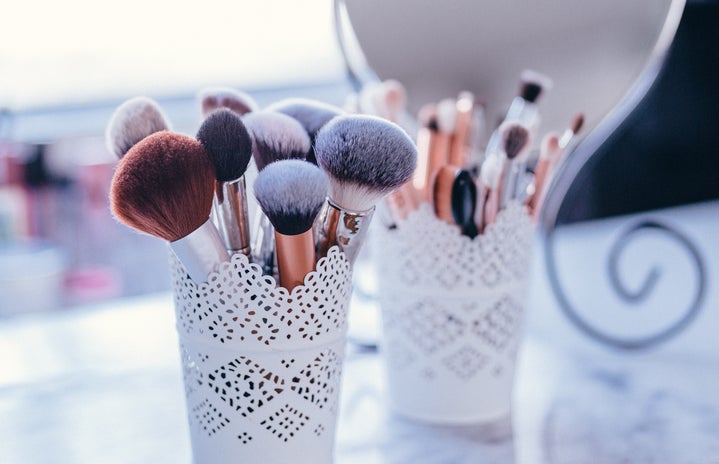Justification for animal torture goes as far back as 500 B.C., and it persists in most countries today. One of the most common ways that animal torture manifests itself in your life may be hiding in your makeup bag, your cute new winter wardrobe, or even your skin care products.
Animal testing in cosmetics and fur usage in makeup brushes and clothing is more common than people think, but let’s back up before we decide to toss our favorite mascara in the can. To what extent does human profit outweigh ethical reasoning? No sane person would intentionally harm their pets. However, many would in fact unknowingly profit a company that engages in animal torture for testing. When it is so socially acceptable, the cycle seems tough to break. Luckily, breaking the cycle isn’t as complicated as it seems.
The Science: Animals Have Feelings Too
By large, many evolutionary biologists would agree that animals do and are capable of doing many interesting things that humans would never think to do (Clemmitt)― but what does this mean for putting animals in a similar justice framework to that of humans? A huge difference between human and animal intelligence, one that many biologists struggle to face up to, is that animals are generally slower than humans to recognize the motives of others (Clemmitt). That being said, part of the sinister nature of animal testing is that animals are more or less unaware of the motives of factory workers. Even some sheared animals are abused for resisting the horrific motives of farm workers (see video on Daily Mail). This shows how workers can neglect the farm animals’ consciousness.
But is all fur bad?
One debate I had regarding fur products occurred with my mother after she purchased boots made with bunny fur. She defended her right to buy fur products by claiming that since the animals were sheared, they were not harmed. As I have explained before, this is not a reliable claim, and it stems from false marketing. It’s nice to imagine bleating sheep and bunnies frolicking happily through a green meadow after their clipping-session, but sadly, this just isn’t the reality.
But how will we know if a product is safe for humans?
Another conversation I recently had with a friend demonstrates a common argument. When she recommended a L’Oreal lipstick for me, I told her I don’t support L’Oreal because of their animal testing policy. She responded, “I respect that, but if it isn’t tested on animals, then how can we know that it’s safe for humans?” This is certainly a logical question, however, general skeptics of cruelty-free marketing, like my friend, are unaware that there are other product testing methods that are eco friendly, less expensive, and more effective.
A common cruelty-free alternative is the use of cell cultures, which scientists use to grow 3D structures that mimic the human body in tiny inventive chips called “organs-on-chips” (“Cruelty Free International”). Other alternatives include donated or post-mortem human tissue, computer studies, and volunteer studies (“Cruelty Free International”). According to the worldwide activist organization “Cruelty Free International”, chemical testing on pregnant rats is only accurate 60% of the time, while the cell-based alternative is 100% accurate. Similarly, skin allergy tests on guinea pigs are only 72% accurate, while the cell-based alternative is 90% accurate (“Cruelty Free International”). That means it’s time to say goodbye to animal torture, and hello to compassion— AND better skin!
Is it really cruelty-free?
In November 2014, China’s Food and Drug Administration lifted the legislation that required animal testing in cosmetics (McLeod). However, there is still some confusion as to whether companies selling in China can be considered cruelty-free. China still requires foreign companies to make their products available for in state-certified laboratory testing (“Ethical Elephant”). When a company selling in China claims to be cruelty free, that could mean that they aren’t doing the animal testing themselves. Such companies can’t be trusted. For example, Benefit cosmetics, which sells products in China, claims to be cruelty free─ “unless required by law” (“Ethical Elephant”).
How can I shop cruelty-free?
There is much debate and research being done to move towards the abolition of animal testing in cosmetics and fur usage in fashion. Unfortunately, there is a great length to go. On the bright side, shopping cruelty free is a very easy task. The first step is to check products for labels. Cruelty free brands will have a small label, usually a bunny rabbit, on their products that indicates support from an animal activist organization. Common reliable labels include Caring Consumer, organized under PETA, Leaping Bunny under Cruelty Free International, and CCF Rabbit under Choose Cruelty Free.
Other options include referencing EWG cosmetics before purchasing from a company (a cosmetics database designed to educate consumers on the environmental status of various cosmetic and hygiene products), or using smartphone applications such as “Cruelty Cutter” to scan items and get notified on their animal testing status. Every drug/convenience store sells cruelty free brands. Many of them are very affordable (see E.L.F., Wet n Wild, Milani, etc). Similarly, many luxury brands are going cruelty free as well (see Urban Decay, Too Faced, Kat Von D, Jeffree Star Cosmetics, etc).
Cruelty-free shopping: A better you
Cruelty-free shopping is easy, ethical, and eco friendly. It is a simple change, and the first step towards being more compassionate and aware. Next time you shop for cosmetics, check your products. The simple change speaks volumes for those who don’t have a say in their quality of life.
Sources:
library.cqpress.com/cqresearcher/cqresrre2010102200.
www.crueltyfreeinternational.org/why-we-do-it/alternatives-animal-testing.
www.youtube.com/watch?v=9HN7SnepC5s&has_verified=1.
ethicalelephant.com/does-benefit-test-on-animals/.
library.cqpress.com/cqresearcher/document.php?id=cqr_ht_animal_rights_2014&type=hitlist&num=0.
features.peta.org/cruelty-free-company-search/index.aspx.
www.ewg.org/skindeep/#.W1QBq1KZMdU.
ethicalelephant.com/cruelty-free-loopholes/.
C01d38e41db215af2435438eab0272ae.png
https://cdn.adorncosmetics.com.au/media/wysiwyg/rabbit.png
https://media0.giphy.com/media/qUIm5wu6LAAog/giphy.gif
1c3b96e7fae044b036828b3f9d068eed.gif



